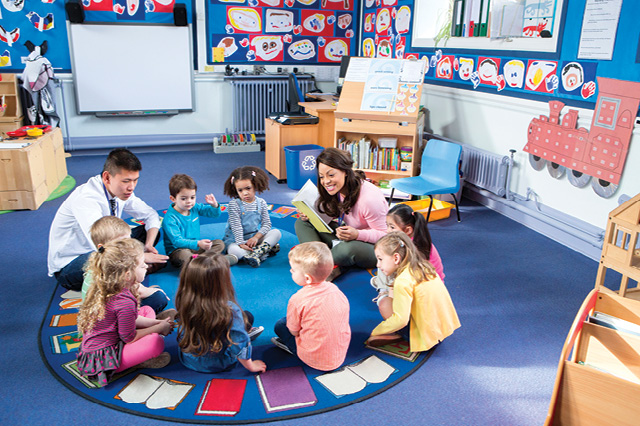Spend enough time with toddlers, and they’ll surprise you.
Sometimes, it’s by using an unexpected word or phrase. Other times, it’s by running, jumping or climbing with unexpected skill. These acts demonstrate the impressive growth occurring during a child’s earliest years. What children learn, and how, during this period can have lifelong effects.
That may be one reason that the percentage of 3 and 4 year olds enrolled in preschool and kindergarten in 2014 was 10 percent higher than in 1990.
“High-quality preschool is important for children because they are developing physically, socially and emotionally. They are also learning language and literacy skills, and cognitive skills,” said Susan Friedman, senior director of content strategy and development at the National Association for the Education of Young Children. “A high-quality preschool is a place where children can grow and develop in all these areas and have fun, too.”
Here are 10 things for parents to know about preschool.
1. Why it’s important.
At high-quality preschools, children develop large and small motor skills through activities like climbing playground equipment and solving puzzles, Friedman said. They develop social and emotional skills by playing and empathizing with other children. Their language and literacy skills develop from listening, talking, reading and writing, while cognitive growth stems from teachers encouraging students to solve thought-provoking problems.
2. When to start.
Whether children start preschool at age 3 or 4 depends on their families. Considerations range from whether parents need a place for their children to go while they’re at work to whether children have friends, toys, games and time to run around outside at home every day.
3. Getting them ready.
Going to a library or bookstore for story time is a helpful way of prepping children for preschool, as is a special visit to meet their new teachers. It also helps to read children books about going to school, and get them accustomed to eating lunch from a lunchbox, said Friedman.
4. Knowing if they’re ready.
There are no clear guidelines for determining if a child is ready. Instead, parents should judge whether a program is best suited to their child. Parents whose children nap may want a program that maintains that routine.
5. If they’re nervous.
Habits are valuable ways of making children feel comfortable in a new environment. Establishing drop-off and pickup routines can help ease anxiety.
6. How to choose.
No two preschools are the same, though high-quality programs share attributes. Look for schools with classroom materials that engage and challenge children, offer a mix of group and independent activities and set and explain clear behavioral limits, Friedman said.
7. How many days.
How often students attend preschool depends on family circumstances. Parents who work full-time may send their children every day, while parents who spend days at home might prefer a part-time schedule.
8. Public versus private.
Public preschool can be a great option when it’s available. There are many differences versus private programs, including student-teacher ratios, hours and costs. Parents should learn as much about public programs as possible to help decide if they’re a good fit.
9. How it’s going.
Don’t worry too much about preschool success. The important thing is that children are engaged in joyful learning that encourages growth, Friedman said, not mastering reading or arithmetic skills.
10. When it’s over.
The end of preschool marks the beginning of kindergarten. Parents can help children prepare for the switch by visiting their new schools and teachers, and adjusting schedules before the new school year begins.
3 Thoughts on “10 Considerations When Choosing a Preschool”
Leave A Comment
Comments are subject to moderation and may or may not be published at the editor’s discretion. Only comments that are relevant to the article and add value to the Your AAA community will be considered. Comments may be edited for clarity and length.

















Thank you for explaining that establishing drop-off and pickup routines can help your children to feel more at ease. My sister has been wondering how to help her son feel prepared and less anxious for preschool. I’ll have to share this idea with her so that she can start planning for this right away.
It was interesting when you said that preschools could allow children to develop their emotional and social skills by playing with other children. My 4-year old nephew appears to be too timid, and he always refuses to play with other children. I will be sure to ask my sister to find a preschool where his skills could be developed well.
My husband and I want to send our little girl to preschool, but we want to choose the best one for her. I appreciate you mentioning the importance of choosing a school that provides materials that engage children’s learning and set clear behavioral limits. We will be sure to keep this in mind as we search for the perfect preschool for our daughter.